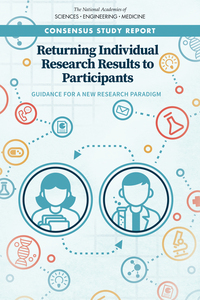I have become the human subjects police. No, I’m not talking about regulations or compliance. I mean that whenever I hear someone use the term “human subject,” I immediately correct them: “research participant.” This compulsion reflects a larger trend in biomedical research, in which people who volunteer for research studies are considered to be essential partners in the process. As part of this partnership, it is important that we consider the interests and values of our partners, such as the growing recognition that research participants might want the individual results of the research in which they participated returned to them.
Yesterday, the National Academies of Sciences (NAS) released the report of the Committee on Returning Individual-Specific Research Results from Research Laboratories, titled “Returning Individual Research Results to Participants: Guidance for a New Research Paradigm.” As I wrote last year, NIH, FDA, and CMS collaborated to sponsor this study in recognition of the increasing challenge for the research enterprise posed by determining how and when to provide research participants with their individual-level research results and data, and whether the current regulatory environment is conducive to returning such results.
In the course of their work, the committee considered the justification for the return of individual-specific research results and found that while no single ethical principle requires the return of results, they assessed the potential benefits of returning individual-specific research results to generally be understated and the harms overstated. True to its title, the report recommends a broad shift in the research enterprise towards greater return of individual-specific research results than is currently common practice. The committee stressed, however, the need for quality in returning research results, and more broadly, for all research results. They conclude that greater return of research results and adoption of enhanced quality control measures would both strengthen the research enterprise by increasing the value for participants while improving scientific rigor and reproducibility.
To achieve this transformation, the report provides a series of recommendations, including specific regulatory and policy changes that would enable greater return of individual-specific research results while promoting greater quality, as well as articulating a process for determining whether and how to return results. Although some of the recommendations are directed at policymakers, they will also be of interest to investigators, institutions, Institutional Review Boards (IRBs), and research participants.
We are grateful to the NAS and the Committee members for their thoughtful treatment of the complex issues they were tasked with addressing. NIH will be reviewing and considering these recommendations with our federal partners and in conversation with the research community.
And as you can probably guess from Recommendation 12G, when it comes to the choice of “subject” or “participant,” this Committee is on trend.




